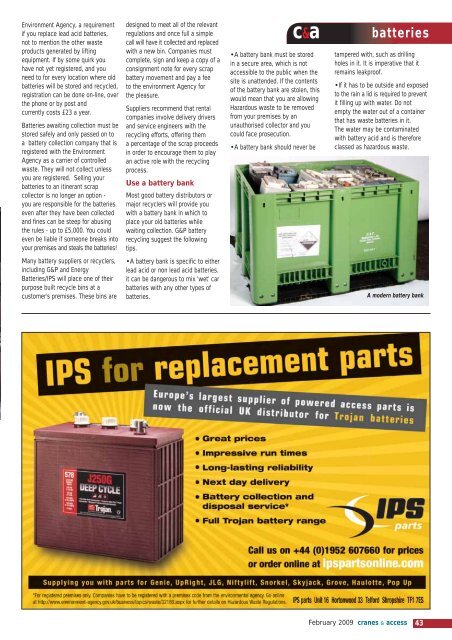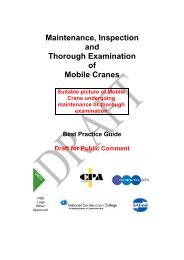You also want an ePaper? Increase the reach of your titles
YUMPU automatically turns print PDFs into web optimized ePapers that Google loves.
Environment Agency, a requirement<br />
if you replace lead acid batteries,<br />
not to mention the other waste<br />
products generated by lifting<br />
equipment. If by some quirk you<br />
have not yet registered, and you<br />
need to for every location where old<br />
batteries will be stored and recycled,<br />
registration can be done on-line, over<br />
the phone or by post and<br />
currently costs £23 a year.<br />
Batteries awaiting collection must be<br />
stored safely and only passed on to<br />
a battery collection company that is<br />
registered with the Environment<br />
Agency as a carrier of controlled<br />
waste. They will not collect unless<br />
you are registered. Selling your<br />
batteries to an itinerant scrap<br />
collector is no longer an option -<br />
you are responsible for the batteries<br />
even after they have been collected<br />
and fines can be steep for abusing<br />
the rules - up to £5,000. You could<br />
even be liable if someone breaks into<br />
your premises and steals the batteries!<br />
Many battery suppliers or recyclers,<br />
including G&P and Energy<br />
Batteries/IPS will place one of their<br />
purpose built recycle bins at a<br />
customer's premises. These bins are<br />
designed to meet all of the relevant<br />
regulations and once full a simple<br />
call will have it collected and replaced<br />
with a new bin. Companies must<br />
complete, sign and keep a copy of a<br />
consignment note for every scrap<br />
battery movement and pay a fee<br />
to the environment Agency for<br />
the pleasure.<br />
Suppliers recommend that rental<br />
companies involve delivery drivers<br />
and service engineers with the<br />
recycling efforts, offering them<br />
a percentage of the scrap proceeds<br />
in order to encourage them to play<br />
an active role with the recycling<br />
process.<br />
Use a battery bank<br />
Most good battery distributors or<br />
major recyclers will provide you<br />
with a battery bank in which to<br />
place your old batteries while<br />
waiting collection. G&P battery<br />
recycling suggest the following<br />
tips.<br />
•A battery bank is specific to either<br />
lead acid or non lead acid batteries.<br />
it can be dangerous to mix 'wet' car<br />
batteries with any other types of<br />
batteries.<br />
c&a<br />
•A battery bank must be stored<br />
in a secure area, which is not<br />
accessible to the public when the<br />
site is unattended. If the contents<br />
of the battery bank are stolen, this<br />
would mean that you are allowing<br />
Hazardous waste to be removed<br />
from your premises by an<br />
unauthorised collector and you<br />
could face prosecution.<br />
•A battery bank should never be<br />
batteries<br />
tampered with, such as drilling<br />
holes in it. It is imperative that it<br />
remains leakproof.<br />
•If it has to be outside and exposed<br />
to the rain a lid is required to prevent<br />
it filling up with water. Do not<br />
empty the water out of a container<br />
that has waste batteries in it.<br />
The water may be contaminated<br />
with battery acid and is therefore<br />
classed as hazardous waste.<br />
A modern battery bank<br />
February 2009 <strong>cranes</strong> & access 43

















